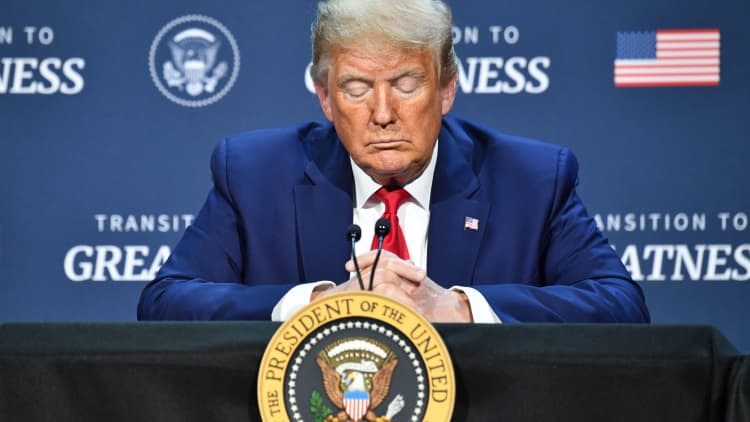President Donald Trump on Friday said that while President Abraham Lincoln — who freed Black people from slavery during the Civil War while also saving the Union — did some good, the "end result" of the 16th president's actions are "always questionable."
Trump's bizarre comment about his fellow Republican came during an interview with Fox News' Harris Faulkner, in which the president said he has done more for the Black community than any other president, with the possible exception of Lincoln.
"So, I think I've done more for the Black community than any other president, and let's take a pass on Abraham Lincoln, cause he did good, although it's always questionable," Trump told Faulkner, who is Black.
"You know, in other words, the end result," Trump continued.
Faulker then interrupted Trump: "Well, we are free, Mr. President. He did pretty well."
Trump replied: "But we are free. You understand what I mean. So I'm gonna take a pass on Abe, Honest Abe, as we call him."
Trump then listed what he said were his actions to benefit Black Americans, including, "Criminal justice reform."
"Nobody else could have done it. I did it," he added.
"I didn't get a lot of notoriety, and the fact the people I did it for then go on television and thank everybody but me, and they needed me to get it done, and I got it done, and I got five or six Republican senators who had no interest in getting it done, and they were great, and we got it done. We did that."
Trump also mentioned his winning approval of long-term federal funding for historically Black colleges and universities.
Trump's interview came nearly three weeks after the death of a Black man, George Floyd, after a white Minneapolis cop kneeled on his neck for more than eight minutes ignited protests nationwide, calls for reform of police departments and demands for the removal of symbols of the Confederacy from public places.
Trump earlier in the week rebuffed suggestions from military officials that 10 Army bases might have their names changed because they currently are named after generals in the Confederacy. All of the bases are in former Confederate states.

"Our history as the Greatest Nation in the World will not be tampered with. Respect our Military!" Trump wrote in a tweet condemning the suggestion.
"My Administration will not even consider the renaming of these Magnificent and Fabled Military Installations," he wrote.
Lincoln was president when the Confederate states seceded from the United States in a doomed effort to save the institution of enslaving Black people.
Trump's first campaign rally since the coronavirus pandemic began spreading widely is scheduled for June 19 in Tulsa, Oklahoma, which was the site of a 1921 massacre of hundreds of Blacks by a white mob. June 19 also is known as "Juneteenth," a holiday marking the end of slavery in the U.S.
The president told Faulkner on Friday that the day of the rally was not chosen intentionally to coincide with Juneteenth but called it an "interesting" date and one of "celebration."
But Sen. Kamala Harris, D-Calif., has said that the selection of Tulsa on that day for the rally "isn't just a wink to white supremacists — he's throwing them a welcome home party."
Harris, who is Black, is considered a leading contender to become the running mate of presumptive Democratic presidential nominee Joe Biden in the 2020 election.


